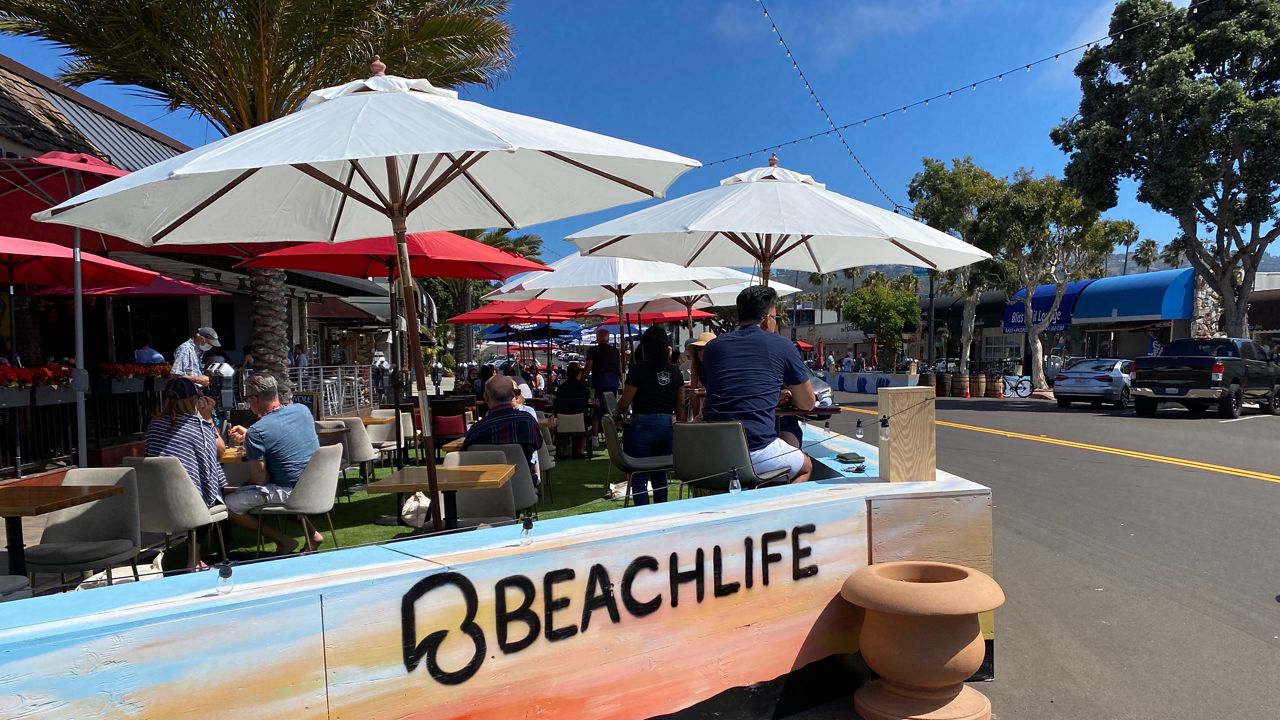On Wednesday, California Gov. Gavin Newsom responded to a resurgence of COVID-19 cases throughout the state by closing dine-in restaurant service in Los Angeles County and 18 other counties.
But shortly before state restrictions were put in place, Redondo Beach approved a plan for an “outdoor dining and sidewalk sale” from the Riviera Village Association, a network of business owners in the city’s south-side neighborhood shopping district.
As of the July 4 weekend, multiple extended “parklettes” have been constructed on both sides of Redondo’s Catalina Avenue between Avenida del Norte and Vista del Mar. Outside of restaurants, the barricaded spaces are carpeted with fake grass and filled with tables and chairs appropriately spaced for County dining guidelines.
The permit helped put Redondo’s Riviera Village in line with neighboring cities that have already established successful “al fresco” dining programs. Manhattan Beach and El Segundo have allowed for parklettes and closed-street dining spaces. Nearby Hermosa Beach is also establishing an outdoor dining program that could include closed streets.
“We were saying, if we could expand to the street, that would allow the restaurants to be at full capacity, with social distancing,” RVA President Jeff Ginsburg told Spectrum News 1. It took a bit of back and forth (the initial pitch was to close Catalina outright, turning it into a walk street, not unlike Santa Monica’s Third Street Promenade), but the organization settled on its parklette plan.
Riviera Village Association’s plan is ostensibly an application for a special event, similar to the area’s seasonal street fairs and carnivals — but this plan is set to run for two months, ending after Labor Day weekend. It may be extended beyond that stop date, but the primary goal was to help the businesses survive the summer, according to Redondo Beach Public Works Director Ted Semaan.
Like those local festivals, RVA has plans to benefit both its restaurants and retail shops, allowing merchants to do outdoor sidewalk sales. In this case, RVA is fronting the costs for building the barriers ($35,000, Ginsburg said), and businesses will pay to use the space — almost like renting stalls at a street fair. For its part, the City of Redondo Beach is waiving parking meter fees at those spaces being topped with the temporary parklettes.
The spaces, and their barriers, were set up by event promoter and restauranteur Allen Sanford, who has ownership stakes in the Rockefeller restaurants, Hermosa Beach’s Saint Rocke music venue, and events like Redondo’s BeachLife Festival. Sanford tapped Venice-based muralist Jules Muck to add art to the barriers — and where he could, he fit in a little bit of BeachLife branding, to ensure people “know that we’re authentic and doing our part for the community.”
When asked how business is going, Sanford paused for a beat. “Not that good,” he said, dripping with understatement. When the pandemic hit, his operations — from the festival to concerts to dining — were essentially halted.
“The game right now is not to make money, it’s to keep your business together for when this gets better,” Sanford said. “Without people, you don’t have a business. So just keeping people employed right now – and safe – is the number one goal.”
Sanford was able to build a parklette at Rockefeller’s Manhattan Beach location, thanks in part to the city's relatively quick reaction to aid businesses. Manhattan Beach has also closed portions of one city street for businesses near the municipal pier and reduced speed limits to facilitate outdoor dining in the El Porto neighborhood, near the city’s northern boundary.
Hermosa Beach had considered similar measures early in the pandemic, according to City Council member Stacey Armato, but it retreated when locals reacted poorly, believing the city was attempting to sneakily impose a “road diet” to slow traffic.
Hermosa will again discuss possibilities for closing streets and parking stalls this week, beginning with an advisory commission meeting on Monday.
“As much as we want to create more space, we can’t do it out of nowhere unless we talk about closing down some of our streets to create what you’re seeing in Manhattan Beach and El Segundo,” Armato said. (El Segundo has closed its Richmond Street at Grand Avenue, to create an outdoor dining area for its downtown restaurants.)
Now, in Redondo, the only thing to do is to watch if business picks up despite growing COVID-19 infection rates. On July 4, businesses appeared to be doing well during the lunch hour, even if it was muted compared to a typical Independence Day weekend.
All Sanford hopes is for customers to be kind.
“The general public has been pent up, and they’re aggressive. They’re taking it out on restaurant people, and that’s not right,” Sanford said. “I hope that people realize that restaurants are now going through another cost, spending more money, just to be able to do business. At the very least, people can be respectful and appreciative. Tip! And don’t complain if there’s no mustard on your burger.”



